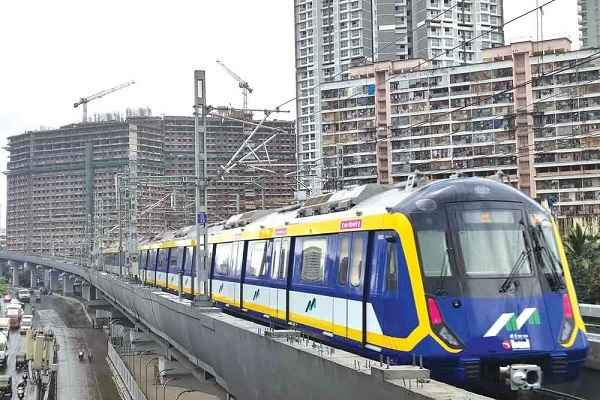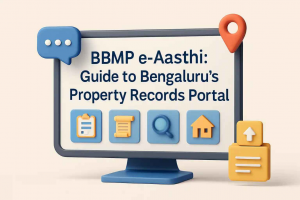Mumbai — the city that never sleeps — is constantly evolving to keep up with its fast-paced rhythm. One of the most awaited infrastructural marvels adding to its growing public transport network is the Mumbai Metro Yellow Line, also known as Metro Line 2A. Designed to reduce road congestion and enhance connectivity between the western suburbs, this corridor is a vital step in transforming how Mumbaikars commute daily.
This in-depth guide explores everything you need to know about the Yellow Line Metro Mumbai — including its stations, timings, route map, ticket prices, fare chart, and more. Whether you’re a daily commuter, an investor eyeing property growth near metro zones, or just a curious Mumbaikar, this blog will give you a complete picture of this metro line’s importance and utility.
Also Read:- Mumbai Metro Line 5: Route Map | Stations List | Opening Date | Today Status
What Is the Yellow Line Metro in Mumbai?
The Yellow Line Metro Mumbai, officially known as Metro Line 2A, is part of the Mumbai Metro network that connects Dahisar East to D.N. Nagar (Andheri West). This elevated corridor spans around 18.6 kilometers and includes 17 stations, making it one of the most important north-south connectors in the city’s western suburbs.
It’s designed to serve thousands of passengers daily, easing travel for those commuting between northern and western parts of Mumbai, especially during peak office hours. The Mumbai Metro Line 2A integrates with other major lines like Line 7 (Red Line) and Line 1 (Versova-Andheri-Ghatkopar), further enhancing the city’s overall transport ecosystem.
Also Read:- Mumbai Metro Line 8: Map | Status | Stations | Connectivity
What Are the Yellow Line Metro Mumbai Stations?
The Yellow Line Metro Mumbai stations are strategically positioned across high-density residential and commercial areas to serve a large commuter base. Here’s a full list of the 17 stations along this route:
- Dahisar East
- Ovari Pada
- Magathane
- Devipada
- National Park
- Bandongri
- Kandarpada
- Dahanukarwadi
- Valnai (Meeth Chowky)
- Kandivali West
- Ekta Nagar
- Bangur Nagar
- Goregaon West
- Oshiwara
- Lower Oshiwara
- Andheri West
- D.N. Nagar
Each station on the Yellow Line Metro Mumbai features escalators, elevators, CCTV surveillance, smart ticketing systems, and accessible entry-exit points for differently-abled passengers.
What Is the Route Map of Yellow Line Metro Mumbai?
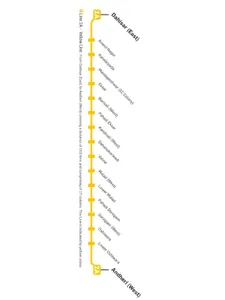
The Yellow Line Metro Mumbai map showcases a well-planned stretch covering Dahisar to D.N. Nagar, running parallel to the Link Road. The corridor intersects with several arterial roads and future metro lines, creating a smooth, interconnected transport web across the western suburbs.
Commuters can easily visualize the Yellow Line Metro Mumbai route map through the Mumbai Metro app, which provides real-time route details, travel time estimates, and interchange points. This digital accessibility allows commuters to plan trips more efficiently and avoid unnecessary waiting time.
Also Read:- Which Areas in Mumbai Offer the Highest ROI for Property Buyers?
What Are the Major Stops on the Yellow Line Metro Mumbai?
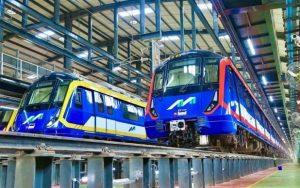
The Yellow Line Metro Mumbai stops cover both residential and commercial hubs. Some of the most significant ones include:
- Andheri West: A crucial junction connecting corporate parks, shopping malls, and residential neighborhoods.
- Goregaon West: Known for its film studios and industrial areas, it’s a key employment hub.
- Kandivali West: Serves dense residential zones and is close to major schools and hospitals.
- Dahisar East: A vital suburban gateway linking commuters to Mira Road and Borivali.
These stops make commuting between workplaces, homes, and entertainment centers much faster and hassle-free.
What Are the Yellow Line Metro Mumbai Timings?
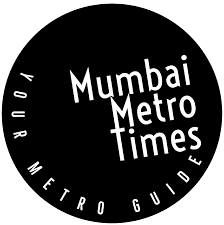
The Yellow Line Metro Mumbai timings are designed to accommodate the city’s dynamic lifestyle. Trains operate approximately between 5:30 AM and 11:30 PM, ensuring convenience for both early morning travelers and late-night commuters.
The frequency during peak hours is around 4–5 minutes, while during non-peak hours, trains are available every 7–10 minutes. The punctuality and reliability of the service have made it a preferred mode of travel for many Mumbaikars who earlier relied on overcrowded roads and local trains.
What Is the Yellow Line Metro Mumbai Fare Chart?

The Yellow Line Metro Mumbai fare chart follows a distance-based pricing model. The minimum fare starts from ₹10 for short trips, going up to ₹60 for end-to-end travel.
Here’s a simplified fare breakdown:
| Distance (km) |
Approx. Fare (₹) |
| 0 – 3 km |
10 |
| 3 – 6 km |
20 |
| 6 – 9 km |
30 |
| 9 – 12 km |
40 |
| 12 – 15 km |
50 |
| 15+ km |
60 |
Passengers can check the complete Yellow Line Metro Mumbai ticket and fare details through the Mumbai Metro 2A app or official ticket counters.
How Can You Book Yellow Line Metro Mumbai Tickets Online?

Booking a Yellow Line Metro Mumbai ticket online is simple and fast. You can use the Mumbai Metro app to purchase single-ride, return, or day passes through UPI, debit/credit card, or digital wallet payments.
Alternatively, you can also buy tickets from station kiosks or customer care counters using smart cards or tokens. For daily commuters, the Mumbai Metro monthly pass online price offers great value and convenience by allowing unlimited rides for a set duration at discounted rates.
What Facilities Are Available on the Yellow Line Metro Mumbai?
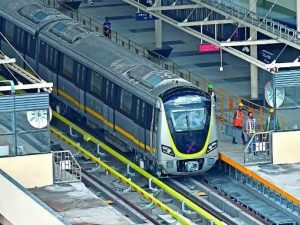
The Yellow Line Metro provides world-class facilities to ensure comfort and safety. Passengers can access:
- Air-conditioned coaches with automatic doors
- CCTV monitoring and security personnel
- Real-time information display systems
- Escalators and elevators for accessibility
- Smart ticketing and mobile-based recharge options
Additionally, every Yellow Line Metro Mumbai station offers parking facilities, retail kiosks, and restrooms, making commuting efficient and comfortable.
How Does the Yellow Line Metro Mumbai App Help Passengers?
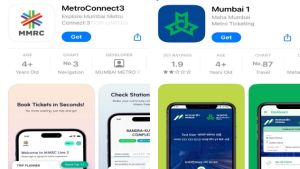
The Yellow Line Metro Mumbai app is an all-in-one travel companion for daily commuters. It allows users to:
- Book Mumbai Metro 2A tickets online
- Track train arrivals and departures in real time
- View updated Yellow Line Metro Mumbai timings
- Access interactive Yellow Line Metro Mumbai map
- Calculate fares and check the fare chart
- Recharge smart cards or monthly passes
The app ensures contactless transactions and enhances the commuting experience through convenience and transparency.
What Are the Benefits of the Yellow Line Metro Mumbai?

The Yellow Line Metro brings several long-term benefits to the city:
- Reduced traffic congestion on major western routes
- Improved air quality due to reduced vehicular emissions
- Faster travel time between Dahisar and Andheri
- Enhanced property values around metro corridors
- Smooth interconnectivity with other metro lines and transport modes
It’s a major step towards making Mumbai a truly global, commuter-friendly city.
Is the Yellow Line Metro Mumbai Linked to Other Lines?
Yes. The Yellow Line Metro Mumbai connects with:
- Metro Line 1 (Blue Line) at D.N. Nagar for east-west travel
- Metro Line 7 (Red Line) at Dahisar East for north-south connectivity
These interchanges make traveling across Mumbai faster, allowing commuters to switch routes seamlessly without relying on road transport.
Conclusion
The Yellow Line Metro Mumbai is not just a transport corridor—it’s a game changer for the city’s urban lifestyle. By connecting key neighborhoods and business zones along the western suburbs, it’s dramatically reducing travel time and improving connectivity. With advanced facilities, reliable frequency, and digital ticketing through the Mumbai Metro app, the experience is modern, efficient, and safe.
For homebuyers and investors, areas along the Yellow Line Metro Mumbai stations are witnessing a significant rise in property demand and appreciation potential. Seamless metro access enhances the livability and value of residential projects nearby—an important insight for those exploring real estate opportunities.
At Housiey, we aim to make your home-buying experience as smooth as your metro ride—transparent, broker-free, and reliable.
If you enjoyed this blog, don’t miss our in-depth guide on the “Andheri West Metro Line” for more insights on Mumbai’s growing metro network and its real estate impact.
FAQs
Mumbai — the city that never sleeps — is constantly evolving to keep up with its fast-paced rhythm. One of the most awaited infrastructural marvels adding to its growing public transport network is the Mumbai Metro Yellow Line, also known as Metro Line 2A. Designed to reduce road congestion and enhance connectivity between the western suburbs, this corridor is a vital step in transforming how Mumbaikars commute daily.
This in-depth guide explores everything you need to know about the Yellow Line Metro Mumbai — including its stations, timings, route map, ticket prices, fare chart, and more. Whether you’re a daily commuter, an investor eyeing property growth near metro zones, or just a curious Mumbaikar, this blog will give you a complete picture of this metro line’s importance and utility.
Also Read:- Mumbai Metro Line 5: Route Map | Stations List | Opening Date | Today Status
What Is the Yellow Line Metro in Mumbai?
The Yellow Line Metro Mumbai, officially known as Metro Line 2A, is part of the Mumbai Metro network that connects Dahisar East to D.N. Nagar (Andheri West). This elevated corridor spans around 18.6 kilometers and includes 17 stations, making it one of the most important north-south connectors in the city’s western suburbs.
It’s designed to serve thousands of passengers daily, easing travel for those commuting between northern and western parts of Mumbai, especially during peak office hours. The Mumbai Metro Line 2A integrates with other major lines like Line 7 (Red Line) and Line 1 (Versova-Andheri-Ghatkopar), further enhancing the city’s overall transport ecosystem.
Also Read:- Mumbai Metro Line 8: Map | Status | Stations | Connectivity
What Are the Yellow Line Metro Mumbai Stations?
The Yellow Line Metro Mumbai stations are strategically positioned across high-density residential and commercial areas to serve a large commuter base. Here’s a full list of the 17 stations along this route:
- Dahisar East
- Ovari Pada
- Magathane
- Devipada
- National Park
- Bandongri
- Kandarpada
- Dahanukarwadi
- Valnai (Meeth Chowky)
- Kandivali West
- Ekta Nagar
- Bangur Nagar
- Goregaon West
- Oshiwara
- Lower Oshiwara
- Andheri West
- D.N. Nagar
Each station on the Yellow Line Metro Mumbai features escalators, elevators, CCTV surveillance, smart ticketing systems, and accessible entry-exit points for differently-abled passengers.
What Is the Route Map of Yellow Line Metro Mumbai?

The Yellow Line Metro Mumbai map showcases a well-planned stretch covering Dahisar to D.N. Nagar, running parallel to the Link Road. The corridor intersects with several arterial roads and future metro lines, creating a smooth, interconnected transport web across the western suburbs.
Commuters can easily visualize the Yellow Line Metro Mumbai route map through the Mumbai Metro app, which provides real-time route details, travel time estimates, and interchange points. This digital accessibility allows commuters to plan trips more efficiently and avoid unnecessary waiting time.
Also Read:- Which Areas in Mumbai Offer the Highest ROI for Property Buyers?
What Are the Major Stops on the Yellow Line Metro Mumbai?

The Yellow Line Metro Mumbai stops cover both residential and commercial hubs. Some of the most significant ones include:
- Andheri West: A crucial junction connecting corporate parks, shopping malls, and residential neighborhoods.
- Goregaon West: Known for its film studios and industrial areas, it’s a key employment hub.
- Kandivali West: Serves dense residential zones and is close to major schools and hospitals.
- Dahisar East: A vital suburban gateway linking commuters to Mira Road and Borivali.
These stops make commuting between workplaces, homes, and entertainment centers much faster and hassle-free.
What Are the Yellow Line Metro Mumbai Timings?

The Yellow Line Metro Mumbai timings are designed to accommodate the city’s dynamic lifestyle. Trains operate approximately between 5:30 AM and 11:30 PM, ensuring convenience for both early morning travelers and late-night commuters.
The frequency during peak hours is around 4–5 minutes, while during non-peak hours, trains are available every 7–10 minutes. The punctuality and reliability of the service have made it a preferred mode of travel for many Mumbaikars who earlier relied on overcrowded roads and local trains.
What Is the Yellow Line Metro Mumbai Fare Chart?

The Yellow Line Metro Mumbai fare chart follows a distance-based pricing model. The minimum fare starts from ₹10 for short trips, going up to ₹60 for end-to-end travel.
Here’s a simplified fare breakdown:
| Distance (km) |
Approx. Fare (₹) |
| 0 – 3 km |
10 |
| 3 – 6 km |
20 |
| 6 – 9 km |
30 |
| 9 – 12 km |
40 |
| 12 – 15 km |
50 |
| 15+ km |
60 |
Passengers can check the complete Yellow Line Metro Mumbai ticket and fare details through the Mumbai Metro 2A app or official ticket counters.
How Can You Book Yellow Line Metro Mumbai Tickets Online?

Booking a Yellow Line Metro Mumbai ticket online is simple and fast. You can use the Mumbai Metro app to purchase single-ride, return, or day passes through UPI, debit/credit card, or digital wallet payments.
Alternatively, you can also buy tickets from station kiosks or customer care counters using smart cards or tokens. For daily commuters, the Mumbai Metro monthly pass online price offers great value and convenience by allowing unlimited rides for a set duration at discounted rates.
What Facilities Are Available on the Yellow Line Metro Mumbai?

The Yellow Line Metro provides world-class facilities to ensure comfort and safety. Passengers can access:
- Air-conditioned coaches with automatic doors
- CCTV monitoring and security personnel
- Real-time information display systems
- Escalators and elevators for accessibility
- Smart ticketing and mobile-based recharge options
Additionally, every Yellow Line Metro Mumbai station offers parking facilities, retail kiosks, and restrooms, making commuting efficient and comfortable.
How Does the Yellow Line Metro Mumbai App Help Passengers?

The Yellow Line Metro Mumbai app is an all-in-one travel companion for daily commuters. It allows users to:
- Book Mumbai Metro 2A tickets online
- Track train arrivals and departures in real time
- View updated Yellow Line Metro Mumbai timings
- Access interactive Yellow Line Metro Mumbai map
- Calculate fares and check the fare chart
- Recharge smart cards or monthly passes
The app ensures contactless transactions and enhances the commuting experience through convenience and transparency.
What Are the Benefits of the Yellow Line Metro Mumbai?

The Yellow Line Metro brings several long-term benefits to the city:
- Reduced traffic congestion on major western routes
- Improved air quality due to reduced vehicular emissions
- Faster travel time between Dahisar and Andheri
- Enhanced property values around metro corridors
- Smooth interconnectivity with other metro lines and transport modes
It’s a major step towards making Mumbai a truly global, commuter-friendly city.
Is the Yellow Line Metro Mumbai Linked to Other Lines?
Yes. The Yellow Line Metro Mumbai connects with:
- Metro Line 1 (Blue Line) at D.N. Nagar for east-west travel
- Metro Line 7 (Red Line) at Dahisar East for north-south connectivity
These interchanges make traveling across Mumbai faster, allowing commuters to switch routes seamlessly without relying on road transport.
Conclusion
The Yellow Line Metro Mumbai is not just a transport corridor—it’s a game changer for the city’s urban lifestyle. By connecting key neighborhoods and business zones along the western suburbs, it’s dramatically reducing travel time and improving connectivity. With advanced facilities, reliable frequency, and digital ticketing through the Mumbai Metro app, the experience is modern, efficient, and safe.
For homebuyers and investors, areas along the Yellow Line Metro Mumbai stations are witnessing a significant rise in property demand and appreciation potential. Seamless metro access enhances the livability and value of residential projects nearby—an important insight for those exploring real estate opportunities.
At Housiey, we aim to make your home-buying experience as smooth as your metro ride—transparent, broker-free, and reliable.
If you enjoyed this blog, don’t miss our in-depth guide on the “Andheri West Metro Line” for more insights on Mumbai’s growing metro network and its real estate impact.
FAQs









